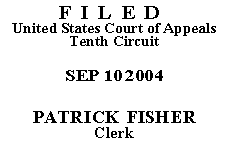

| GUILLERMO SALAZAR,
Petitioner-Appellant, v. JOHN ASHCROFT, Respondent-Appellee. |
|
Petitioner Guillermo Alfonso Salazar Velasquez, appearing pro se, appeals the district court's dismissal of his 28 U.S.C. § 2241 habeas petition challenging the final order of removal entered by the Board of Immigration Appeals (BIA). The district court dismissed some of petitioner's claims and transferred two others to the Ninth Circuit.(1) We review the district court's dismissal of a § 2241 habeas petition de novo. See Patterson v. Knowles, 162 F.3d 574, 575 (10th Cir. 1998). We have jurisdiction under 28 U.S.C. § 1291, and we affirm.
Petitioner is a native of Colombia who entered the United States as a lawful permanent resident in 1975. In 1983, petitioner was convicted in federal court of importing cocaine, an aggravated felony, see 8 U.S.C. § 1101(a)(43)(B), and failure to appear at trial, and was sentenced to thirty-nine months' imprisonment. In 1989, petitioner was convicted in federal court of conspiring to possess cocaine with the intent to distribute and with possessing six kilograms of cocaine with intent to distribute, both aggravated felonies, which subjected him to removal. See 8 U.S.C. § 1227(a)(2)(A)(iii); § 1101(a)(43)(B). He was sentenced to twenty years' imprisonment.
The Immigration and Naturalization Service (INS)(2) commenced removal proceedings in California in 1999.(3) Following numerous hearings, the immigration judge (IJ) denied petitioner's application for asylum, withholding of removal, and protection under the Convention Against Torture, and ordered him removed to Colombia or Spain. In a reasoned decision, the BIA dismissed petitioner's appeal. The Ninth Circuit dismissed his petition for review because it lacked jurisdiction under 8 U.S.C. § 1252(a)(2)(C) (barring courts from reviewing final removal orders of aliens who have been convicted of certain aggravated felonies).
Petitioner, who is incarcerated in New Mexico, then filed his § 2241 habeas petition in New Mexico district court. He asserted numerous arguments in support of his claim that his Fifth Amendment rights were violated during the removal proceedings. Many of petitioner's claims challenged factual findings by the IJ and the BIA. The district court correctly ruled it lacked jurisdiction over these claims because "[o]nly questions of pure law will be considered on § 2241 habeas review." Latu v. Ashcroft, 375 F.3d 1012, 1019 (10th Cir. 2004) (quoting Bowrin v. INS, 194 F.3d 483, 490 (4th Cir. 1999)). Petitioner also asserted very generally that the proceedings violated his due process rights, but he articulated no alleged procedural defect other than his complaint that the proceedings were conducted before different immigration judges and agency counsel. This claim is without merit. The BIA issued a detailed and reasoned determination and, therefore, our review is limited to the BIA's decision, not that of the immigration judge. See Rivera-Jimenez v. INS, 214 F.3d 1213, 1216 (10th Cir. 2000).
Finally, the district court considered petitioner's claim that the loss of his military retirement benefits which will result from his removal violates his due process and double jeopardy rights. We conclude, for substantially the same reasons stated in the magistrate judge's September 24, 2003 recommendation, adopted by the district court on October 9, 2003, that petitioner's constitutional rights have not been denied because any loss of benefits is neither a taking without just compensation, nor a form of criminal punishment.
The judgment of the district court is AFFIRMED. Petitioner's motions for appointment of counsel, for oral argument, and to supplement the record are DENIED. The mandate shall issue forthwith.
Entered for the Court
Chief Judge
*. This order and judgment is not binding precedent, except under the doctrines of law of the case, res judicata, and collateral estoppel. The court generally disfavors the citation of orders and judgments; nevertheless, an order and judgment may be cited under the terms and conditions of 10th Cir. R. 36.3.
2. The Honorable Robin J. Cauthron, Chief District Judge, United States District Court for the Western District of Oklahoma, sitting by designation.
1. Petitioner asserted a claim in his § 2241 petition that he is a naturalized citizen because he served in the United States Army from February 1977 to April 1978. The exclusive means of asserting such a nationality claim is to file a petition for review with the court of appeals for the judicial district in which the immigration judge completed the proceedings, which, in this case, is the Ninth Circuit Court of Appeals. See 8 U.S.C. § 1252(b)(5). Thus, the magistrate judge concluded the district court lacked jurisdiction over this claim, as well as petitioner's related claim that he is entitled to withholding of removal as a naturalized citizen. The magistrate judge recommended these claims be transferred under 28 U.S.C. § 1631 to the Ninth Circuit, for resolution as a petition for review in accordance with § 1252(b)(5). The district court adopted the magistrate judge's recommendation, and, in the same order dismissing petitioner's § 2241 claims, it transferred the petitioner's nationality claim and the related withholding of removal claim to the Ninth Circuit. Although the district judge did not expressly sever these claims under Fed. R. Civ. P. 21, the transfer order clearly indicates that the district court intended to sever these claims and create two separate actions. Thus, we conclude this court has jurisdiction to hear this appeal without a Rule 54(b) certification. See FDIC v. McGlamery, 74 F.3d 218, 222 (10th Cir. 1996).
2. On March 1, 2003, the INS ceased to exist as an agency within the Department of Justice. Its enforcement functions were transferred to the Department of Homeland Security. See Homeland Security Act of 2002, Pub. L. No. 107-296, 116 Stat. 2135 (2002). Because the majority of the events at issue here predate that reorganization, we continue to refer to the INS in this order and judgment.
3. Because removal proceedings were commenced after April 1, 1997, the permanent provisions of the Illegal Immigration Reform and Immigrant Responsibility Act of 1996 apply. Tapia Garcia v. INS, 237 F.3d 1216, 1218 n.2 (10th Cir. 2001).